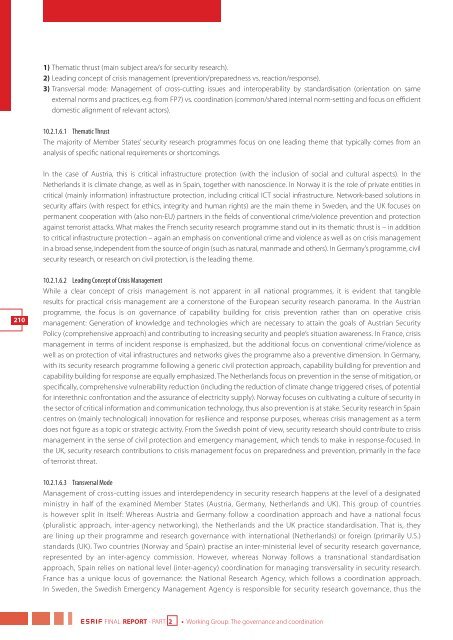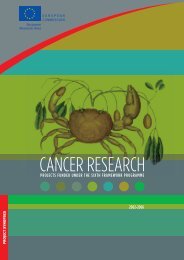I527-290 ESRIF Final Report (WEB).indd - European Commission
I527-290 ESRIF Final Report (WEB).indd - European Commission
I527-290 ESRIF Final Report (WEB).indd - European Commission
Create successful ePaper yourself
Turn your PDF publications into a flip-book with our unique Google optimized e-Paper software.
210<br />
1) Thematic thrust (main subject area/s for security research).<br />
2) Leading concept of crisis management (prevention/preparedness vs. reaction/response).<br />
3) Transversal mode: Management of cross-cutting issues and interoperability by standardisation (orientation on same<br />
external norms and practices, e.g. from FP7) vs. coordination (common/shared internal norm-setting and focus on effi cient<br />
domestic alignment of relevant actors).<br />
10.2.1.6.1 Thematic Thrust<br />
The majority of Member States’ security research programmes focus on one leading theme that typically comes from an<br />
analysis of specifi c national requirements or shortcomings.<br />
In the case of Austria, this is critical infrastructure protection (with the inclusion of social and cultural aspects). In the<br />
Netherlands it is climate change, as well as in Spain, together with nanoscience. In Norway it is the role of private entities in<br />
critical (mainly information) infrastructure protection, including critical ICT social infrastructure. Network-based solutions in<br />
security aff airs (with respect for ethics, integrity and human rights) are the main theme in Sweden, and the UK focuses on<br />
permanent cooperation with (also non-EU) partners in the fi elds of conventional crime/violence prevention and protection<br />
against terrorist attacks. What makes the French security research programme stand out in its thematic thrust is – in addition<br />
to critical infrastructure protection – again an emphasis on conventional crime and violence as well as on crisis management<br />
in a broad sense, independent from the source of origin (such as natural, manmade and others). In Germany’s programme, civil<br />
security research, or research on civil protection, is the leading theme.<br />
10.2.1.6.2 Leading Concept of Crisis Management<br />
While a clear concept of crisis management is not apparent in all national programmes, it is evident that tangible<br />
results for practical crisis management are a cornerstone of the <strong>European</strong> security research panorama. In the Austrian<br />
programme, the focus is on governance of capability building for crisis prevention rather than on operative crisis<br />
management: Generation of knowledge and technologies which are necessary to attain the goals of Austrian Security<br />
Policy (comprehensive approach) and contributing to increasing security and people’s situation awareness. In France, crisis<br />
management in terms of incident response is emphasized, but the additional focus on conventional crime/violence as<br />
well as on protection of vital infrastructures and networks gives the programme also a preventive dimension. In Germany,<br />
with its security research programme following a generic civil protection approach, capability building for prevention and<br />
capability building for response are equally emphasized. The Netherlands focus on prevention in the sense of mitigation, or<br />
specifi cally, comprehensive vulnerability reduction (including the reduction of climate change triggered crises, of potential<br />
for interethnic confrontation and the assurance of electricity supply). Norway focuses on cultivating a culture of security in<br />
the sector of critical information and communication technology, thus also prevention is at stake. Security research in Spain<br />
centres on (mainly technological) innovation for resilience and response purposes, whereas crisis management as a term<br />
does not fi gure as a topic or strategic activity. From the Swedish point of view, security research should contribute to crisis<br />
management in the sense of civil protection and emergency management, which tends to make in response-focused. In<br />
the UK, security research contributions to crisis management focus on preparedness and prevention, primarily in the face<br />
of terrorist threat.<br />
10.2.1.6.3 Transversal Mode<br />
Management of cross-cutting issues and interdependency in security research happens at the level of a designated<br />
ministry in half of the examined Member States (Austria, Germany, Netherlands and UK). This group of countries<br />
is however split in itself: Whereas Austria and Germany follow a coordination approach and have a national focus<br />
(pluralistic approach, inter-agency networking), the Netherlands and the UK practice standardisation. That is, they<br />
are lining up their programme and research governance with international (Netherlands) or foreign (primarily U.S.)<br />
standards (UK). Two countries (Norway and Spain) practise an inter-ministerial level of security research governance,<br />
represented by an inter-agency commission. However, whereas Norway follows a transnational standardisation<br />
approach, Spain relies on national level (inter-agency) coordination for managing transversality in security research.<br />
France has a unique locus of governance: the National Research Agency, which follows a coordination approach.<br />
In Sweden, the Swedish Emergency Management Agency is responsible for security research governance, thus the<br />
<strong>ESRIF</strong> FINAL REPORT - PART 2 • Working Group: The governance and coordination

















